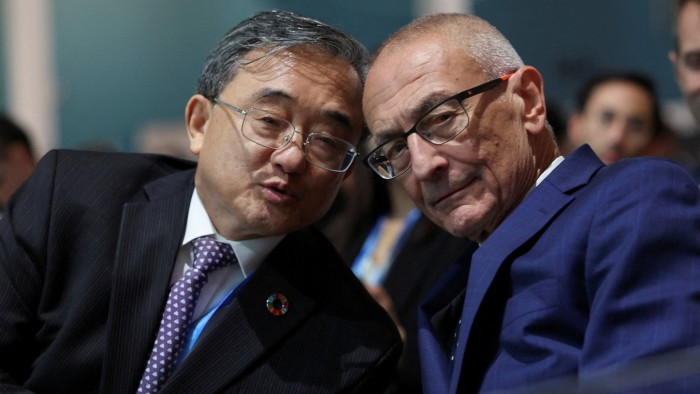Unlock the White House Watch newsletter for free
Your guide to what the 2024 US election means for Washington and the world
China has called for the US to engage in “constructive dialogue” to tackle climate change in future, in a thinly veiled swipe at the incoming Donald Trump administration during the UN COP29 summit in Baku.
Liu Zhenmin, China’s climate envoy, said he hoped “co-operation on global climate action will continue to be enhanced” between the world’s two biggest economies, as he joined US President Joe Biden’s top climate diplomat in urging action on methane and other super-pollutants.
In contrast with the stance of the incoming US president Trump, who has described climate change as a hoax, Zhenmin said China was “firmly committed” to improving its controls over methane and other non-carbon dioxide pollutants.
“Climate change is now a pressing global challenge that demands a collective response from the international community,” Zhenmin told the assembled dignitaries, drawing a round of applause.
Tackling escaped or flared methane emissions, the main component of gas, nitrous oxides and hydrofluorocarbons, is the quickest way to limit global warming as the molecules hold more heat than CO₂ though over a shorter lifespan.
Trump has threatened to reverse decades of US progress on climate change, including by removing the US again from the UN’s Paris Agreement, the accord that drives global climate co-operation between countries, and overhauling Biden-era rules to curb greenhouse gas emissions.
Zhenmin, who took on the role earlier this year after the retirement of his predecessor, said US-China “co-operation on enhancing climate action had been effective over the past year”, and thanked his counterpart John Podesta.
Podesta confirmed the US had finalised a rule for a new methane levy in the US that applies to big oil and gas producers, although there are concerns it could come under pressure from the incoming Trump administration as it seeks to weaken the remit of the Environmental Protection Agency.
But Podesta said: “The global momentum behind cutting non-CO₂ greenhouse gases is strong and growing. It’s bigger than any one country and it will take collective co-operation to get it right. For our sake and for our children’s sake, failure, of course, is not an option.”
Zhenmin’s comments laid bare the shift in geopolitics as national responses to climate change diverge. During his keynote address as host of the summit, Azerbaijan President Ilham Aliyev said his country was a victim of a “well-orchestrated campaign of slander and blackmail”.
Aliyev has previously described his country’s oil and gas reserves as a “gift from god”, but told COP29 delegates he would be a “strong advocate for the green transition”.
China, as the world’s largest emitter alongside the US, is under pressure to take up a leadership role on climate action following the US election results. The country, which in past years has come in for criticism for being obstructive during global negotiations on climate change, is building up renewable energy and rolling out measures to tackle emissions.
The country is expected to have more than half of the world’s renewable energy by the end of the decade.
In 2023, China rolled out as much solar power as the entire world did the year before, while also building up wind energy, according to the International Energy Agency. Expectations are rising that the country’s emissions may peak years sooner than its 2030 goal.
Zhenmin said China had been “relatively late” in its efforts to address methane emissions compared to developed countries, but added Beijing was now “actively looking” to do so. It had engaged in “extensive efforts” over the past year in monitoring equipment, he added.
Read the full article here




